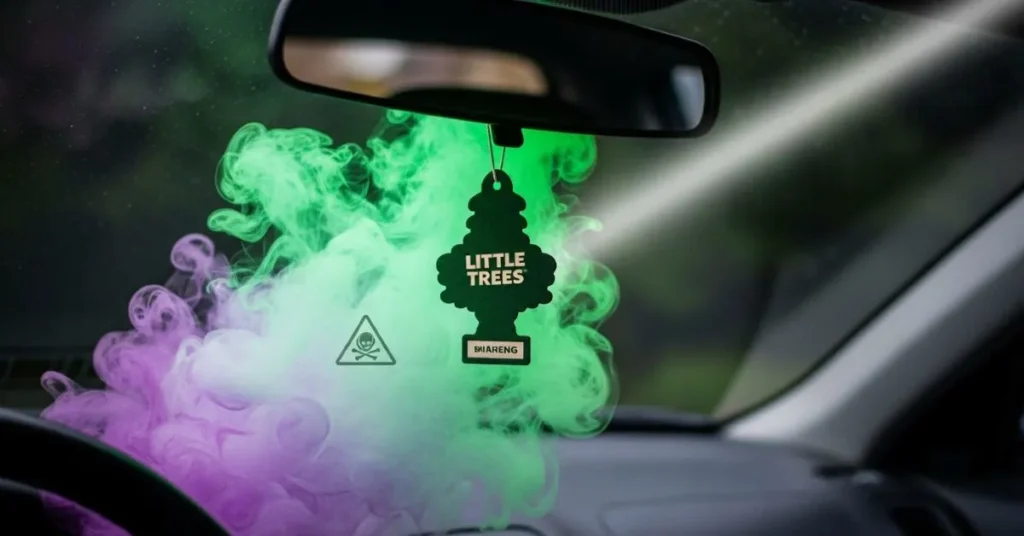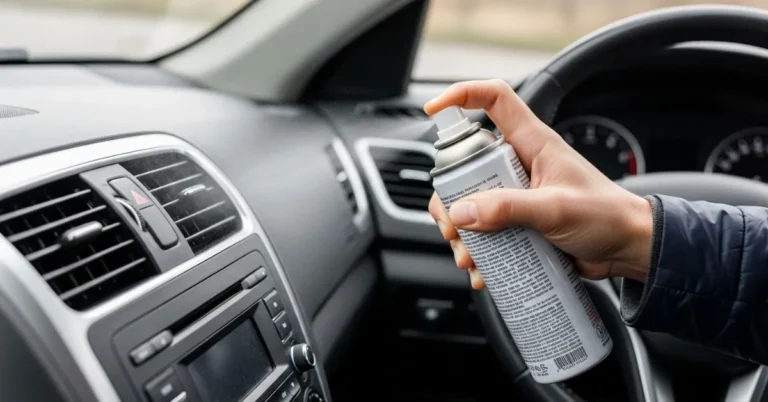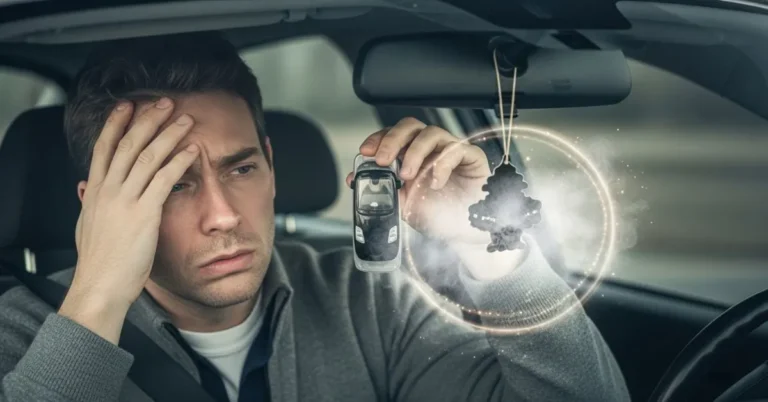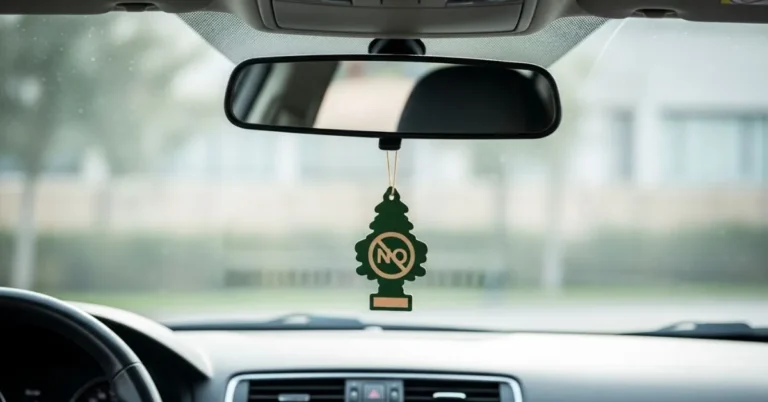Imagine sliding into your car after a hectic day and wondering, Are Little Trees car air fresheners toxic? Instantly, a familiar scent wafts over the unmistakable aroma of a Little Trees air freshener dangling from your rearview mirror. For many drivers, that fresh, piney smell is a comfort, a small daily luxury that masks the unpleasant odors of fast food wrappers and damp gym bags. But in recent years, a growing question has been quietly brewing: could these beloved tree-shaped scent boosters silently release harmful substances into your personal space?

It’s a fair question, especially as more people prioritize health, sustainability, and chemical awareness. You might wonder if that beloved scent is just harmless fragrance magic or something that could affect your well-being.
This blog post will unpack everything you need to know about Little Trees air fresheners from what’s really inside them, potential health risks, who should be cautious, and what safer alternatives exist. Whether you’re a casual driver, a parent, or just curious, this deep dive will help you decide about your car’s scent situation.
Contents
- 1 What Exactly Are Little Trees Car Air Fresheners Made Of?
- 1.1 Are Little Trees Car Air Fresheners Toxic to Humans? The Science Explained
- 1.2 Who Should Think Twice Before Using Little Trees Air Fresheners?
- 1.3 How to Minimize Toxicity When Using Little Trees Air Fresheners
- 1.4 Affordable, Safer Alternatives to Little Trees Air Fresheners
- 1.5 What to Check When Buying a Safe Car Air Freshener
- 1.6 Does Using Little Trees Affect Your Car’s Indoor Air Quality?
- 1.7 How Long Do Little Trees Air Fresheners Last and How Does That Impact Safety?
- 1.8 Are Car Air Fresheners Like Little Trees Regulated for Safety?
- 1.9 Frequently Asked Questions (FAQs)
- 1.9.1 1. Are Little Trees car air fresheners toxic to kids?
- 1.9.2 2. Can Little Trees trigger asthma or allergies?
- 1.9.3 3. Are natural air fresheners safer than Little Trees?
- 1.9.4 4. How can I reduce risks when using Little Trees air fresheners?
- 1.9.5 5. Do Little Trees air fresheners release harmful VOCs?
- 1.10 Expert Thoughts: Are Little Trees Car Air Fresheners Toxic to Humans?
- 1.11 About the Author
What Exactly Are Little Trees Car Air Fresheners Made Of?
To assess whether Little Trees car air fresheners are toxic to humans, we must first understand their ingredients.
The Anatomy of a Little Trees Air Freshener
At a glance, Little Trees air fresheners seem simple: a small cardboard cutout infused with fragrance oils. But that simplicity hides a complex cocktail of chemicals designed to release scent over several weeks.
- Cardboard Base: This porous material acts as a carrier for the fragrance oils.
- Fragrance Oils: A mixture of natural and synthetic aromatic compounds, formulated to emit a consistent scent for 30-45 days.
- Preservatives & Fixatives: Added to stabilize the scent and extend shelf life.
Chemicals Commonly Found in Air Fresheners
The fragrance oils often include phthalates, volatile organic compounds (VOCs), and sometimes formaldehyde-releasing agents. These chemicals serve specific purposes but have raised concerns over health impacts.
- Phthalates help the scent last longer but are suspected endocrine disruptors, which can interfere with hormone systems.
- VOCs evaporate easily at room temperature, contributing to indoor air pollution. Breathing in high concentrations can trigger headaches, lightheadedness, and irritation in your airways.
- Some fragrance chemicals can break into formaldehyde, a known irritant and potential carcinogen.
Are Little Trees Car Air Fresheners Toxic to Humans? The Science Explained
So, are Little Trees car air fresheners toxic? The answer isn’t a simple yes or no. Let’s break down what current research and expert opinions say.
Limited Direct Research, But Cause for Caution
There are very few studies specifically testing Little Trees air fresheners. However, research on air fresheners in general shows:
- Short-Term Exposure: Most people may experience mild symptoms like headaches, watery eyes, or nasal irritation from prolonged exposure to synthetic fragrances.
- Long-Term Exposure: Some chemicals in air fresheners, especially VOCs and phthalates, have been linked to potential respiratory problems, hormonal disruption, and allergies with chronic exposure.
Read More: Are Car Air Fresheners Bad for Dogs to Humans?
The Car Environment: A Perfect Storm?
Your car is a small, enclosed space. When it’s hot or humid, the release of chemicals from air fresheners can intensify. This means the concentration of potentially harmful VOCs inside your vehicle might be higher than in a larger, well-ventilated room.
Sensitive Groups at Higher Risk
Certain populations are more vulnerable:
- Children: Their lungs are still developing, making them more susceptible to irritants.
- Pregnant Women: Exposure to endocrine disruptors might impact fetal development.
- Asthma and Allergy Sufferers: Synthetic fragrances can trigger symptoms.
Who Should Think Twice Before Using Little Trees Air Fresheners?
If you or your family members fit any of the following profiles, you should reconsider your air freshener choice.
Parents With Young Kids
Kids’ immune and respiratory systems are still maturing, and exposure to airborne chemicals like VOCs and phthalates might increase the risks of asthma and allergies. Small, enclosed car cabins also increase the potential for the buildup of these chemicals.
Allergy and Asthma Sufferers
Synthetic fragrances are among the top triggers for asthma attacks and allergic reactions. If you notice wheezing, coughing, or irritation after using an air freshener, it’s best to stop using it.
Eco-Conscious Drivers
If lowering your carbon footprint and cutting down on plastic or chemical waste are important to you, disposable synthetic air fresheners may not align with your values.
How to Minimize Toxicity When Using Little Trees Air Fresheners
If you love the scent of Little Trees but want to play it safe, here’s how to reduce risks:
- Ventilate your car frequently. Make it a habit to open windows frequently, letting fresh air disperse any VOCs or chemical buildup.
- Limit usage duration. Don’t leave air fresheners hanging all year long; replace them periodically or remove them when unnecessary.
- Avoid placing near children’s seating areas. Keep fresheners away from where kids sit.
- Choose milder scents if possible. Stronger fragrances usually mean more chemicals.
- Don’t use multiple air fresheners simultaneously. This can increase the chemical load inside your car.
Affordable, Safer Alternatives to Little Trees Air Fresheners
If the thought of chemicals makes you uneasy, you’re in luck. Several eco-friendly, affordable alternatives can keep your car smelling fresh naturally.
Natural Essential Oil Diffusers
Compact diffusers that use natural oils like peppermint, eucalyptus, or lemon can provide fresh scent without synthetic chemicals. Many come rechargeable and reusable.
Baking Soda or Activated Charcoal
These natural odor absorbers neutralize smells instead of masking them. You can place small sachets or bags under your seats.
DIY Herbal Sachets
Fill breathable pouches with dried lavender, rosemary, or mint leaves. They release subtle, fresh scents without harsh chemicals.
Eco-Friendly Commercial Options
Brands now offer air fresheners free from phthalates, parabens, and VOCs, often using biodegradable materials and refillable designs.
What to Check When Buying a Safe Car Air Freshener
To make sure you’re not exposing yourself to toxins, here’s a handy checklist:
- Read ingredient labels carefully. Avoid products listing phthalates, parabens, or ambiguous “fragrance” without details.
- Look for certifications. Certifications like “Green Seal” or “Made Safe” indicate safer formulations.
- Opt for natural fragrances or fragrance-free products.
- Choose products with recyclable or biodegradable packaging.
- Consider price vs. safety. Sometimes spending more gets you a healthier product.
Does Using Little Trees Affect Your Car’s Indoor Air Quality?
Yes, the chemicals released by Little Trees and other synthetic air fresheners contribute to indoor air pollution inside your vehicle. High levels of VOCs and other fragrance chemicals can reduce air quality, potentially irritating your eyes, throat, and lungs.
Regularly airing out your car and limiting air freshener use can help maintain healthier air inside your vehicle.
How Long Do Little Trees Air Fresheners Last and How Does That Impact Safety?
Typically, a Little Trees air freshener lasts around 30 to 45 days. But heat, humidity, and sun exposure can speed up scent release, increasing your exposure to chemicals in a shorter time.
Remove or replace the freshener if you notice the scent becoming overpowering or irritating.
Are Car Air Fresheners Like Little Trees Regulated for Safety?
Surprisingly, car air fresheners fall into a lightly regulated category in the U.S. Since they are considered consumer fragrance products, agencies like the FDA don’t strictly oversee them.
The EPA monitors VOC emissions but does not regulate specific air freshener products. This means manufacturers aren’t required to fully disclose all chemical ingredients, making assessing safety tricky.
Read More: Can You Reuse Car Air Fresheners? Tips, Hacks & Facts
Frequently Asked Questions (FAQs)
1. Are Little Trees car air fresheners toxic to kids?
While not acutely toxic, the chemical exposure may irritate children’s sensitive lungs. It is best to restrict use and keep away from children’s seats.
2. Can Little Trees trigger asthma or allergies?
Yes. Synthetic fragrances and VOCs can commonly provoke asthma attacks and allergic reactions in sensitive individuals.
3. Are natural air fresheners safer than Little Trees?
Generally, yes. Choices like essential oils or baking soda offer a chemical-free alternative to the toxins commonly found in synthetic air fresheners.
4. How can I reduce risks when using Little Trees air fresheners?
Ventilate your car regularly, avoid multiple fresheners at once, swap them out often, and keep them away from children.
5. Do Little Trees air fresheners release harmful VOCs?
Yes, they release VOCs, which can contribute to indoor air pollution and cause irritation, especially in enclosed spaces.
Expert Thoughts: Are Little Trees Car Air Fresheners Toxic to Humans?
So, are Little Trees car air fresheners toxic to humans? They contain chemicals that could pose mild to moderate health risks, especially with prolonged exposure in small spaces like cars. However, for most healthy adults using them occasionally, the risk is low.
However, children, pregnant women, people living with asthma, and allergy-prone individuals should exercise caution or consider safer alternatives. By ventilating your car, limiting exposure, and exploring natural options, you can keep your ride smelling fresh without sacrificing your health.




